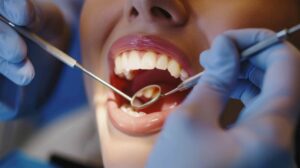
You might be familiar with mammograms or colonoscopies, but you should know that your dentist can also help you screen for cancer. Oral cancer, or oropharyngeal cancer, has been seeing a steady increase in diagnoses, so it’s important to honor this April as Oral Cancer Awareness Month. Let’s take a moment to review the basics of this this type of cancer and what you can do to protect you and your loved ones from it.
Factors that Increase Risk for Oral Cancer
As with many cancers, oral cancer doesn’t discriminate between its victims. There are known cases for all ages and genders. Still, certain groups of people should be particularly vigilant, including:
- Smoking and nonsmoking tobacco users. These days it’s common knowledge that smoking tobacco can cause a multitude of cancers. However, nonsmoking sources are just as dangerous.
- Heavy drinkers. Similarly, heavy alcohol consumption increases risk for multiple cancer types, including oral.
- Biological males. Although biological females can be affected by oral cancer, biological males are at a much higher risk of developing this disease.
- Those diagnosed with HPV or cervical cancer. Research has found a link between HPV, cervical cancer, and oral cancer, particularly in biological males.
Not all of these factors are preventable, and for many, controlling their tobacco and alcohol intake is an arduous, lifelong struggle. This should be acknowledged and makes it even more important to know what to look for.
Signs that Could Indicate Oral Cancer
It can be difficult to notice oral cancer early on, but if you do happen to see these signs, you should consult with your dentist promptly.
- Any lumps, sores, growths, rough areas, crusty areas, or thickened areas in your mouth
- Discoloration, pain, sensitivity, or numbness along the tongue, gums, lips, or other soft oral tissues
- Difficulties in chewing, swallowing, speaking, or otherwise moving the tongue or jaw
- Changes in bite, alignment at rest, or denture fit
- Throat discomfort, such as feeling there’s something stuck or uncomfortable changes in voice
You should pay special attention to symptoms that don’t recede after 14 days, aren’t receptive to treatment, or bleed easily.
For more help in identifying oral cancer, visit the Check Your Mouth website. The Oral Cancer Foundation organized this fantastic resource, so the self-check methods are reliable and the information is trustworthy. For further confirmation, make an appointment with your dentist to get to the bottom of your symptoms.
How to Help Prevent Oral Cancer
As of yet, there aren’t any vaccines for cancer, which means preventative care comes down to being mindful about your health. Watching for signs and routinely checking your mouth are great ways to spot oral cancer early. However, you wouldn’t forgo your mammogram or colonoscopy simply because you’re doing your own homework, or simply because you’re a healthy individual.
Going to your dentist for an oral cancer screening drastically increases your odds of surviving by allowing professionals to diagnose and treat the cancer before it spreads to your lymph nodes or lungs. Many dentists perform a screening during regular checkups, which means it’s likely that your insurance will cover the cost. With that in mind, there’s no reason not to attend your bi-annual checkups – and plenty of reasons to stay consistent.
About the Practice
Our dedicated team of dentists at Care 32 Dental of Fort Worth provide top-notch services with a personalized touch. They’ll help you monitor your oral health, and make sure you’re informed about the condition of your mouth and treatment options. To make an appointment or ask for preventative care recommendations, call 817-741-1300. For a full list of services, visit our website.
